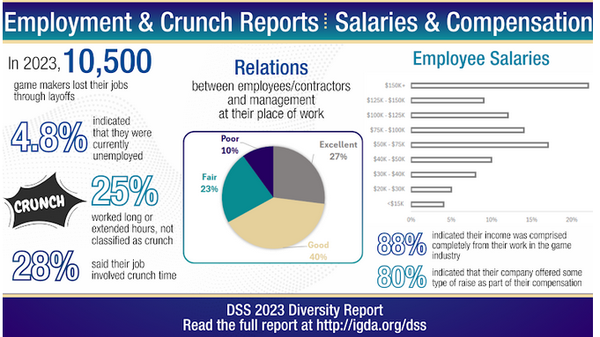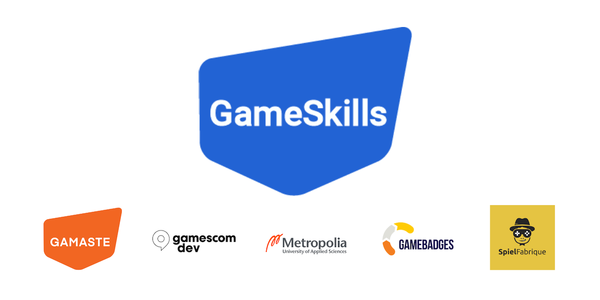Crunch or Long Hours Expected as a Normal Part of the Job




The IGDA and Western University have released the 2023 Developer Satisfaction Survey. While two-thirds of respondents are satisfied with their jobs, 28 per cent complain about crunch time and 25 per cent complain about overtime that is not described as crunch. Diversity and proper crediting were also issues.
The International Game Developers Association (IGDA) has released its 2023 Developer Satisfaction Survey (DSS) in partnership with Western University. Between 17 May and 20 October 2023, 777 respondents gave their opinions on topics including Diversity, Inclusion, Employment, Crunch, and Proper Crediting. 58 per cent of respondents work in the United States or Canada, 31 per cent are women, 79 per cent identify as White/Caucasian or European.
"The Developer Satisfaction Survey is a meaningful tool that helps games industry professionals identify what issues matter most among their peers," said Dr. Jakin Vela, executive director of IGDA. "Identifying the critical issues highlighted in this report is the first step in moving forward as an industry, and as a community."
According to the IGDA, 10,500 game makers lost their jobs due to redundancies. 4.8 per cent of respondents said they were unemployed at the time of the survey. "A majority of respondents reported relations between employees/contractors and management at their place of work were good (40%) or excellent (27%) as opposed to fair (23%) or poor (10%)," the IGDA concludes. 28 per cent said that their job involved crunch time (33 per cent in 2021), 25 per cent worked long or extended hours that did not qualify as crunch (22 per cent in 2021). Those who experienced crunch had crunched more than twice in the past two years, 63 per cent of employees (2021: 58), 64 per cent of freelancers (2021: 64) and 75 per cent of self-employed (2021: 63). "Many respondents, particularly freelancers, felt that crunch or long hours was expected as a normal part of their job."
48 per cent said that their studio/company had a game credit policy. 71 per cent were very confident that their name would appear in the credits of the title they were working on. "When respondents were asked to consider what would happen if they left the studio or their contract ended before the game shipped, this percentage dropped to 41%."
85 per cent felt that diversity in the workplace and in game content was important, while 87 per cent felt that diversity in the games industry was important. These are both slight decreases compared to the 2021 survey. "More than half of the respondents (58%) felt the game industry had become more diverse over the past two years. This is more in line with the DSS 2019 data (57%) after a low of 49% in 2021," says the International Game Developers Association. 28 per cent of respondents reported that their workplace had no equity, diversity and inclusion programmes. Many said their company had policies on general non-discrimination (72 per cent), equal opportunity hiring (61 per cent) or sexual harassment (62 per cent). 67 per cent said that there was no equality of treatment and opportunity in the industry (74 per cent in 2021). 43 per cent of respondents felt that anti-discrimination policies in the workplace were adequately enforced, compared to 41 per cent in 2021.
The full Summary Report is available on the IGDA DSS page, along with previous Summary Reports.
Never miss anything from the German, Swiss and Austrian games industry again: subscribe for free to our Daily newsletter and get all news straight to your inbox.








